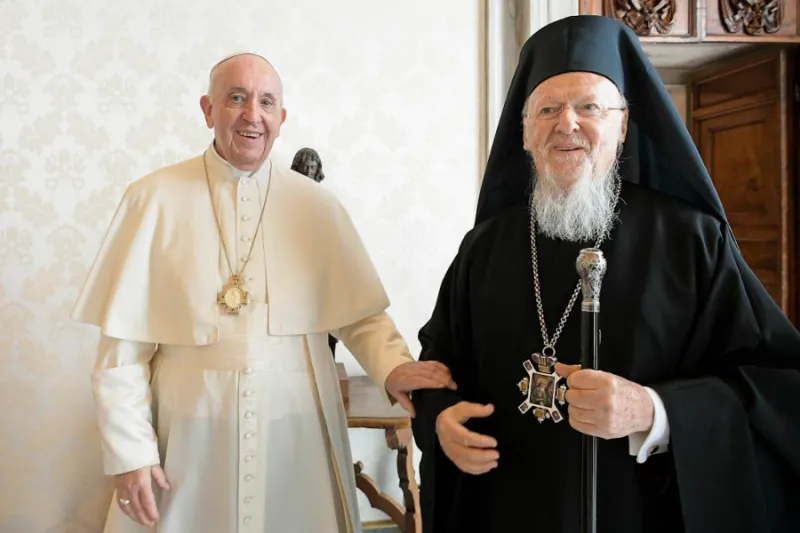
Vatican City, Oct 22, 2021 / 04:00 am (CNA).
Pope Francis sent a letter Friday to Ecumenical Patriarch Bartholomew I expressing gratitude for the “profound personal bond” between them.
“It is with gratitude to God that I reflect on our own profound personal bond, from the time of the inauguration of my papal ministry, when you honored me with your presence in Rome,” Pope Francis wrote in the letter on Oct. 22.
“Over time, this bond has become a fraternal friendship nurtured in many meetings not only in Rome, but also at the Phanar, in Jerusalem, Assisi, Cairo, Lesvos, Bari, and Budapest.”
Pope Francis sent the letter to the 81-year-old Orthodox leader to mark the 30th anniversary of his election as Ecumenical Patriarch.
Bartholomew I has served as the Ecumenical Patriarch of Constantinople — considered the “first among equals” in the Eastern Orthodox Church — since 1991.
The pope reflected on their shared dedication to working to safeguard creation, confronting the social repercussions of the COVID-19 pandemic, and fostering unity between Christians.
“I sincerely thank you for ceaselessly indicating the way of dialogue, in charity and in truth, as the only possible way for reconciliation between believers in Christ and for the reestablishment of their full communion,” Pope Francis said.
“With God’s help, this is the path along which we will most certainly continue to walk together, for the closeness and solidarity between our Churches are an indispensable contribution to universal brotherhood and social justice, of which humanity is so urgently in need.”

Bartholomew was recently in Rome, joining Pope Francis at an interreligious prayer gathering for peace in front of the Colosseum and signing a joint appeal at the Vatican asking countries to “achieve net-zero carbon emissions as soon as possible.”
The Orthodox leader was also present in Budapest for the International Eucharistic Congress in September, including the closing Mass offered by Pope Francis.
The two leaders could soon meet again. Unconfirmed reports have indicated that Pope Francis may visit Greece, including a stop at the Greek island of Lesbos (also known as Lesvos), before the end of 2021.
The pope made his previous visit to Lesbos in 2016, in partnership with the Orthodox patriarch, to draw attention to the plight of migrants on the island.
“On the joyful occasion of the 30th anniversary of your election as Archbishop of Constantinople and Ecumenical Patriarch, I express my fervent best wishes: Χρόνια πολλά! Ad multos annos,” Pope Francis wrote.
“I join you in thanksgiving to the Lord for the many blessings bestowed upon your life and ministry over these years, and pray that God, from whom all gifts come, will grant you health, spiritual joy and abundant grace to sustain every aspect of your lofty service.”
If you value the news and views Catholic World Report provides, please consider donating to support our efforts. Your contribution will help us continue to make CWR available to all readers worldwide for free, without a subscription. Thank you for your generosity!
Click here for more information on donating to CWR. Click here to sign up for our newsletter.




Leave a Reply